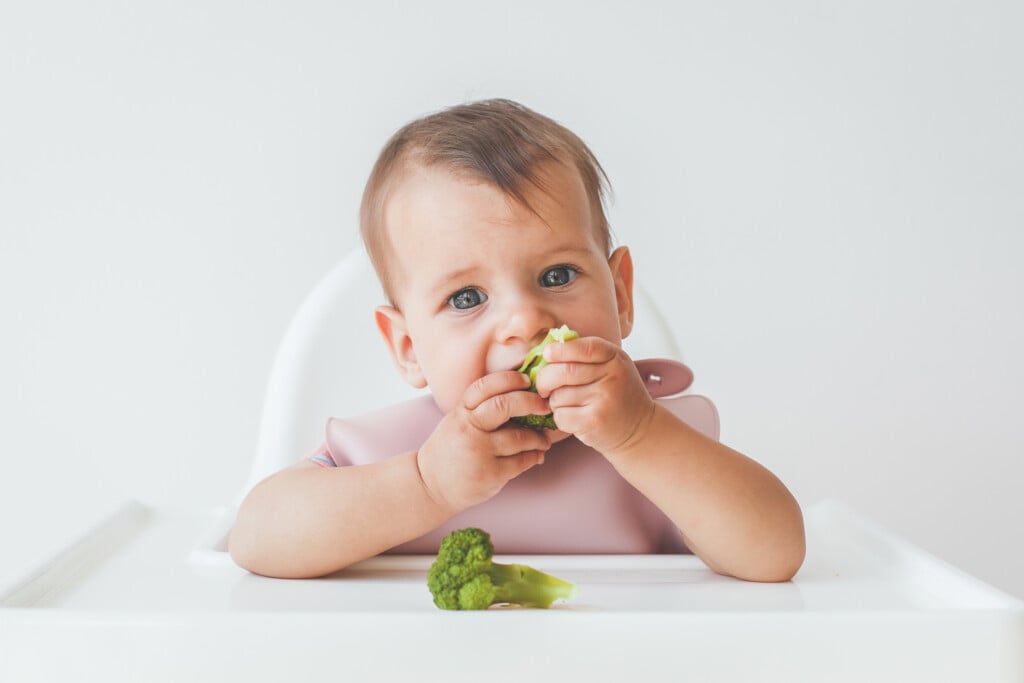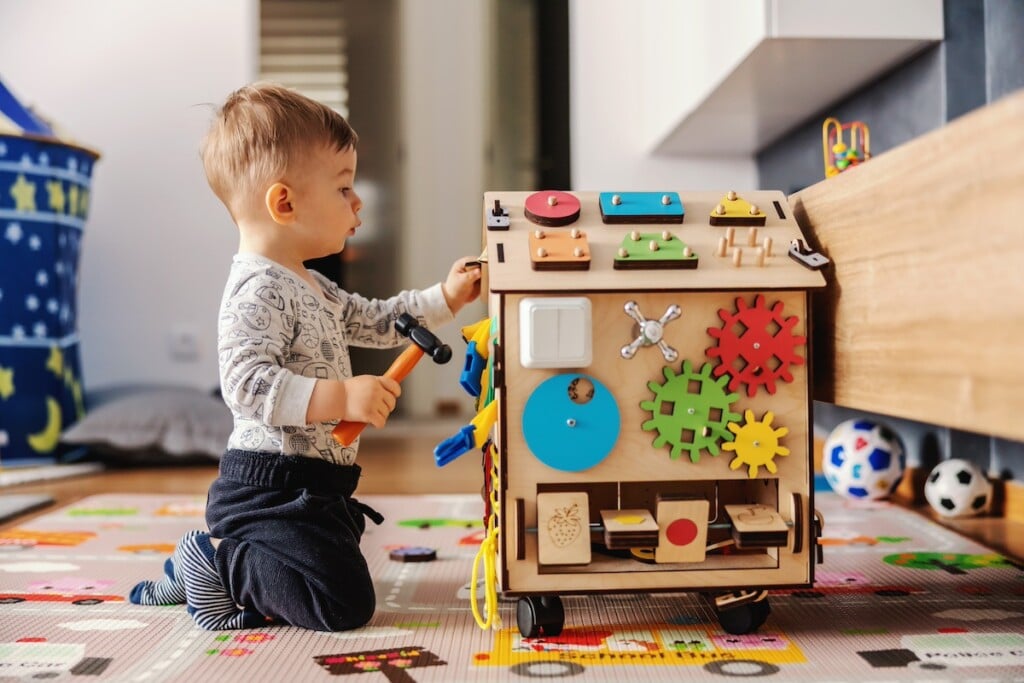Starting Solids and Avoiding Allergies

We interviewed Malina Malkani, MS, RDN, CDN, about best practices for starting babies on solid foods and how to avoid food allergies. Malkani is the owner of Malina Malkani Nutrition and author of Safe and Simple Food Allergy Prevention.
Q: What is a baby-led approach to starting solids?
A: In essence, a baby-led approach to starting solids allows the baby to set the pace and lead the process of learning to eat complementary foods. Babies can get the best of both worlds, self-feeding soft finger foods from the family table and enjoying purees and mashes served on a preloaded spoon and/or spoonfed responsively (i.e., watching for and responding to the baby’s cues for hunger and fullness).
Using a combination of finger foods and purees allows the baby to self-regulate while providing plenty of exposure to diverse foods, flavors and textures. It also makes it easier to switch between caregivers who use different feeding models, such as daycare and home.
Q: When should parents start feeding their baby solids?
A: The Dietary Guidelines for Americans and most major health organizations agree that starting solids at around 6 months is the sweet spot, once a baby is showing the developmental signs of readiness for food. The signs of readiness include the ability to sit upright with minimal support, good head and neck control, being able to grasp larger objects and bring them to the mouth and showing interest in food.
Sometimes babies are developmentally ready a little earlier than 6 months, and that’s fine and even potentially more advantageous from a food allergy prevention perspective, as long as solids aren’t started before 4 months.
Q: Are there adverse effects or health reasons that parents should not start feeding solids too early?
A: There are risks associated with starting solids too early (meaning before 4 months of age), which include an increased risk of type 1 diabetes, celiac disease and food allergies. There are also risks associated with starting solids too late, meaning after 7 months, and these include an increased risk of food allergies and other feeding-related issues.
Q: What are the best solids to start with, and how/when should new ones be introduced? And is it OK to start with “regular” table food?
A: There is no perfect first food for babies! Ideal early foods for babies pack a lot of nutrition into a small amount, as babies have small stomachs and high nutrient needs, and learning to eat can take time—so it’s smart to maximize the nutrition in each bite.
Nutrient-rich early food options include ripe avocado, banana, steamed green beans or broccoli, and sticks of roasted sweet potato—these are all “regular” table foods that can be easily modified for babies. Strips of well-cooked steak that babies can suck (but not necessarily ingest yet), soft meatballs and mashed lentils are additional early food options that provide iron and zinc, which are key nutrients for growth, and for brain and immune system development at this stage.
Once caregivers have offered a few early foods and gotten the process of eating underway, it’s time to start offering allergenic foods like peanut and egg in baby-safe forms. Offering top allergenic foods early and consistently during infancy helps prevent the development of food allergies, but the window of time when food allergy prevention is most effective is short, so it’s important not to miss it or delay introduction.
In terms of cadence, single food introductions of non-top allergenic foods and waiting a certain number of days before introducing another new food is now considered outdated advice. It ends up causing unnecessary strain on caregivers and makes it difficult to achieve diet diversity, which seems to be protective against food allergies. A better goal is to try and introduce at least one new food per day.
Conversely, single food introductions of top allergens and pausing for a few days before introducing another is a conservative, common-sense approach to allergen introduction that, in the event of a reaction, makes it easier to figure out which food is responsible, but there’s no evidence that it’s necessary or better; it’s simply a helpful option that can reduce stress and confusion around food introduction.
Q: Can you address toxins in baby food? For example, arsenic in rice and heavy metals in other baby foods. Is it dangerous? How can parents eliminate or mitigate the toxins babies may get from food?
A: The issue of heavy metals in baby food isn’t a problem that is unique to baby food. Heavy metals are present in our food supply, existing in tiny amounts in both soil and water.
In baby food, heavy metals are particularly concerning, however, because babies have small bodies and high nutrient needs, which makes them more susceptible during a period of rapid growth and neurological development.
To help reduce a child’s exposure to toxic metals in the food supply, the most important step parents can take is to offer a variety of foods. Different foods offer different nutrients—and different levels and types of contaminants. Offering a variety helps ensure that babies and children are getting the range of nutrients they need to thrive and grow, while helping to ensure that they aren’t taking in too much of any one specific contaminant. It’s also helpful to stay on top of your child’s iron status, because people who are deficient in iron tend to absorb two to three times as much lead.
Q: What else should parents know about starting solids?
A: Starting solids and introducing allergens can and should feel simple, safe and joyful! But stress and confusion can creep into the process as a result of feeding myths and misinformation, fear and pressure from extended family, and well-intentioned healthcare providers who may not necessarily be up to date on the latest infant feeding guidelines.
As a pediatric dietitian and single mother of three, my goal in writing Safe & Simple Food Allergy Prevention: A Baby-Led Feeding Guide to Starting Solids and Introducing Top Allergens was to combine my years of practical and professional feeding experience with the latest research on infant feeding and food allergy prevention into a single, stress-free resource for parents that makes feeding and allergen introduction feel easy and delicious for the whole family. This guide will help parents breeze through the process confidently, with practical tips and plenty of recipes to help little eaters learn to enjoy food!





